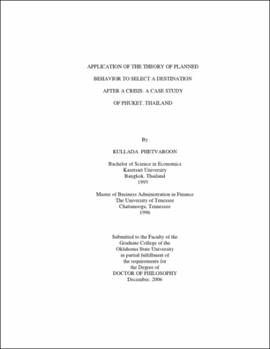| dc.contributor.advisor | Kim, Woody | |
| dc.contributor.author | Phetvaroon, Kullada | |
| dc.date.accessioned | 2013-11-26T08:33:26Z | |
| dc.date.available | 2013-11-26T08:33:26Z | |
| dc.date.issued | 2006-12 | |
| dc.identifier.uri | https://hdl.handle.net/11244/7268 | |
| dc.description.abstract | Scope and Method of Study: The objectives of this study were 1) to compare tourists' perceptions of destination attributes before and after a disaster occurred; 2) to empirically test the applicability of the theory of planned behavior (TPB) model, with the addition of past behavior, in the tourism context; and 3) to identify the underlying dimensions of motivation for choosing Phuket as a travel destination. A cross-sectional sample survey was conducted. The target population was all international tourists who traveled to Phuket, Thailand, during the survey period. Data was analyzed using both univariate and multivariate techniques with SPSS and LISREL 8.5. Using LISREL 8.5, the Structural Equation Model (SEM) was employed to determine the causal relationship between predictor variables and to test hypotheses to confirm the causal relationships. | |
| dc.description.abstract | Findings and Conclusions: Results indicate that after the Tsunami, tourists were more concerned about "safety and security" and "disaster protection and warning system." In descending order, subjective norm, perceived behavior control, attitude, and past behavior had positively significant effects on tourist behavior intention when choosing Phuket as a travel destination after the Tsunami. The existence of a moderating effect of country origin between subjective norm and behavioral intention was tested. Interestingly, the study disclosed that the positive influence of subjective norm on tourist behavior intention was greater among tourists from Western countries than from Asian countries. These unexpected findings may be attributed to the fact that most Western tourists were independent travelers, who are more likely to have a high involvement level during their travel planning process. On the other hand, since a majority of Asian counterparts were package tourists, they tend to take advantage of reasonably priced package deals and may have had a low level of involvement. Tourists with a low level of involvement are less likely to rely on other reference groups' opinions when making a travel destination choice. Lastly, dimensions of motivation for choosing Phuket as a travel destination were identified. The results of this study suggest that travel motivations may be used as a basis for market segmentation. The Tourism Authority of Thailand (TAT) and marketers at tourist destinations may be able to closely match available tourism products with the diverse needs of tourists who have differentiated travel motivations. | |
| dc.format | application/pdf | |
| dc.language | en_US | |
| dc.rights | Copyright is held by the author who has granted the Oklahoma State University Library the non-exclusive right to share this material in its institutional repository. Contact Digital Library Services at lib-dls@okstate.edu or 405-744-9161 for the permission policy on the use, reproduction or distribution of this material. | |
| dc.title | Application of the theory of planned behavior to select a destination after a crisis: A case study of Phuket, Thailand | |
| dc.contributor.committeeMember | Leong, Jerrold | |
| dc.contributor.committeeMember | Parakurthi, Radesh | |
| dc.contributor.committeeMember | Warde, William D. | |
| osu.filename | Phetvaroon_okstate_0664D_2027 | |
| osu.accesstype | Open Access | |
| dc.type.genre | Dissertation | |
| dc.type.material | Text | |
| thesis.degree.discipline | Human Environmental Science | |
| thesis.degree.grantor | Oklahoma State University | |
